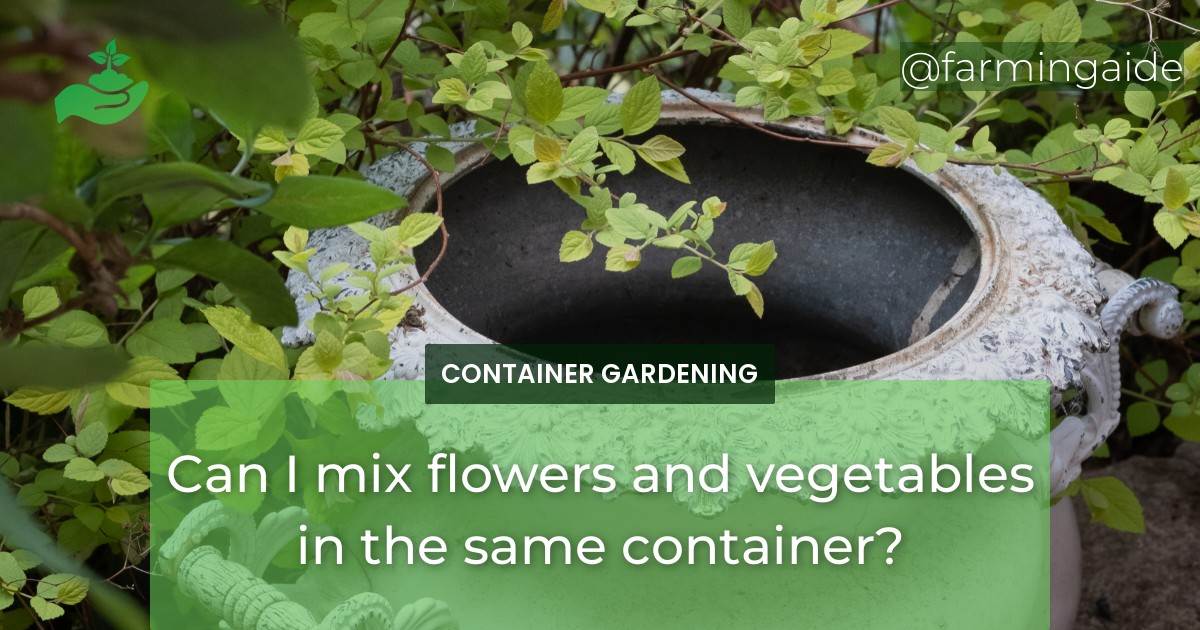Container gardening is a popular way to grow plants in a limited space. It allows you to grow flowers and vegetables in a small area, providing you with fresh produce and beautiful blooms. One of the most common questions among container gardeners is whether they can mix flowers and vegetables in the same container. The answer is yes! In fact, combining flowers and vegetables in container plantings has several benefits, including maximizing use of space, promoting pollination, and natural pest control.
Benefits of Combining Flowers and Vegetables in Container Plantings
Maximizes Use of Space
In container gardening, space is always a concern. By combining flowers and vegetables in the same container, you can maximize the use of your limited space. You can grow two types of plants in the same area, creating a beautiful and functional garden.
Promotes Pollination
Bees and other pollinators are essential for the growth of fruits and vegetables. By planting flowers with your vegetables, you can attract pollinators to your garden and promote pollination. This, in turn, can increase your yield and improve the quality of your produce.
Natural Pest Control
Some flowers, such as marigolds, have natural pest-repelling properties. By planting these flowers with your vegetables, you can naturally control pests and reduce the need for chemical pesticides.
Choosing the Right Combination of Flowers and Vegetables
Consider Growth Habits
When choosing the right combination of flowers and vegetables, it’s important to consider their growth habits. You need to choose plants that have similar water and sunlight requirements and grow at the same pace. This will ensure that one plant doesn’t overshadow the other or outcompete it for resources.
Companion Planting
Companion planting is the practice of growing plants together that benefit each other in some way. Certain flowers can repel pests or attract beneficial insects that will help your vegetable plants grow. For example, planting marigolds with tomatoes can repel nematodes, while planting nasturtiums with cucumbers can attract aphids away from your vegetables.
Soil and Sunlight Requirements
Flowers and vegetables have different soil and sunlight requirements. It’s important to choose plants that have similar needs, so they can grow together in the same container. For example, tomatoes require full sun, while lettuce prefers partial shade.
ALSO READ
Best Flowers to Combine with Vegetables in Container Plantings
Marigolds
- Repel pests, including nematodes and whiteflies
- Attract beneficial insects, such as ladybugs and hoverflies
- Easy to grow and low maintenance
Nasturtiums
- Repel aphids, whiteflies, and cucumber beetles
- Attract beneficial insects, such as bees and hoverflies
- Edible leaves and flowers that add a peppery flavor to salads
Petunias
- Attract pollinators, such as butterflies and hummingbirds
- Easy to grow and come in a variety of colors
- Low maintenance and drought-tolerant
Best Vegetables to Combine with Flowers in Container Plantings
Tomatoes
- Require full sun and warm temperatures
- Benefit from the natural pest control of marigolds
- Grow well with basil, which can repel tomato hornworms
Peppers
- Require full sun and well-draining soil
- Benefit from the natural pest control of marigolds
- Grow well with oregano, which can repel aphids and spider mites
Cucumbers
- Require plenty of sunlight and consistently moist soil
- Benefit from the natural pest control of nasturtiums
- Grow well with dill, which can attract beneficial insects and repel cucumber beetles
ALSO READ
Tips for Maintaining a Healthy Container Garden
Watering and Fertilizing
Container gardens require more frequent watering than traditional gardens. Make sure to water your plants regularly, especially during hot, dry weather. Fertilize your plants every few weeks with a balanced, water-soluble fertilizer to ensure they have the nutrients they need to grow.
Pruning and Deadheading
Regular pruning and deadheading can help keep your plants healthy and looking their best. Remove any dead or damaged leaves and flowers, and trim back any overgrown branches or stems to encourage healthy growth.
Pest Control
Prevention is key when it comes to pest control in container gardens. Keep an eye out for signs of pests, such as chewed leaves or discolored spots. Use natural pest control methods, such as companion planting or insecticidal soap, to control pests without harming your plants.
Common Mistakes to Avoid When Combining Flowers and Vegetables in Container Plantings
Overcrowding
Overcrowding your container can lead to competition for resources and stunted growth. Make sure to choose plants that have similar growth habits and space them out appropriately in your container.
Incompatible Varieties
Some plants are not compatible with each other and can actually harm each other’s growth. For example, planting onions with beans can stunt the growth of the beans. Do your research and choose plants that will grow well together.
Neglecting Maintenance
Container gardens require regular maintenance to keep them healthy and looking their best. Make sure to water and fertilize your plants regularly, prune and deadhead as needed, and control pests before they become a problem.
Conclusion
Mixing flowers and vegetables in container plantings is a great way to maximize your space and get the most out of your container garden. By choosing the right combination of plants and practicing good maintenance techniques, you can create a beautiful and functional garden that provides you with fresh produce and beautiful blooms all season long.
RELATED ARTICLES:


